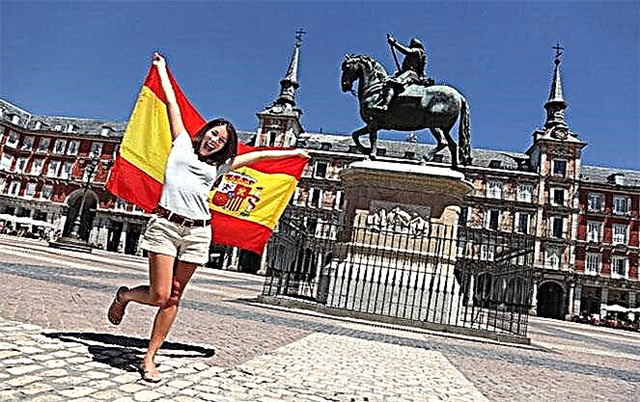Over the past 20 years, from a country that generates emigration, Spain has turned into a state where the largest migration flows are directed. Currently, foreigners make up 10-12% of the total population of the kingdom, in connection with which the Spanish society had to reconsider its views on migrants. Today they are welcome guests in the Iberian Peninsula, and therefore legal immigration to Spain is not as big of a problem as it might seem. We will tell you about the most affordable immigration models and options for moving to this hot European country.

Why Spain
First, let's try to figure out why foreigners choose Spain. The stories about the high standard of living and Spanish salaries are certainly true, but with all this, immigration to Spain has more concrete reasons.
By itself, this phenomenon is multifactorial and is due to a number of reasons, including:
- economic development is, in fact, the most important factor provoking migration. Since 1993, the Spanish economy has shown rapid growth (except for the crisis years of 2011-2012). The development of tourism and construction contributes to the creation of hundreds of thousands of new jobs every year, 40% of which are occupied by migrants. There is also a highly paid job for foreigners (the average salary is 1.5-2 thousand euros), so they go to Spain;
- EU membership is an equally important factor opening up the Schengen area and the European market for foreigners. Having legally moved to the country and received a residence permit, they have the opportunity to move freely, and sometimes work within the European Union;
- mild Mediterranean climate - about a fifth of migrants move to Spain precisely because of its location, preferring coastal settlements such as Alicante or Malaga. Many of them are people with high incomes, retirees from European countries or freelancers who are attracted by the measured lifestyle in the country;
- transparent rules for moving. The economic feasibility and the huge contribution of foreigners to the production of the country's gross domestic product have led to the liberalization of the migration legislation in Spain. Migrants receive transparent rules and legalization mechanisms. With all this, there is a huge number of those in the country who arrived there and live illegally;
- proximity to Africa. The presence of overland crossings from Morocco attracts a huge number of illegal immigrants and refugees from the African continent to the country. The number of people who illegally arrived in Spain "by boat" in 2021 doubled compared to 2021 and amounted to 27 thousand people. Of course, this number is incomparable with the number of "civilized" migrants who want to legally live and work in the kingdom, but this generates negative stereotypes.
Legal immigration methods
For foreigners intending to move to live in the Kingdom of Spain, local legislation provides many legal opportunities. There are family reunification programs, programs for students, and even business immigration models designed for foreign investors. Let's consider the most relevant options suitable for different categories of migrants.
Family reunification of foreigners
If your close relatives have already moved and received an official residence permit in Spain, the easiest way to immigrate is to reunite with them as family members. According to Article 17 of the Law "On the Rights, Freedoms and Social Integration of Foreigners" No. 4/2000 of January 11, 2000 (Sobre derechos y libertades de los extranjeros en España y su integración social), this right is enjoyed by:
- the spouse of a foreigner in a marriage recognized by Spanish law;
- minors or incapacitated children of a foreigner or his spouse;
- persons under the guardianship of a foreigner;
- parents of a foreigner, who are in his support, if they are over 65 years old and there are justified reasons for their move.
All of them receive “La autorización de residencia por reagrupación familiar” (special residence permit). However, before that, according to Art. 8 of the law, a foreigner accepting relatives must:
- re-obtain a residence permit (update the original one), and for the move of parents - to obtain permanent residence;
- prove the availability of housing and money to support the family.
Residence and work permit
Not every residence permit in Spain gives you the right to legal employment. The residence permit, which is issued to a foreigner in case of labor migration, is called Autorización de residencia y trabajo.

According to Art. 36 of the law, it will be required by any person who has reached the age of 16 if he wants to work in the country. Such a permit is issued only at the request of the employer and only for the duration of the employment contract with the employee, provided that the migrant has not been convicted in Spain, is not an EU citizen and is not prohibited from entering the country.
The employer must also provide the immigration authorities with proof of ability to pay and registration in the social security system, as well as the employment contract itself.
At the same time, according to Article 38 of Law No. 4/2000, when employing a foreigner, the employment situation in the country must be taken into account. Simply put, a migrant can only be offered a vacancy that cannot be filled at the expense of the Spaniards.
The list of professions for each region is included in a special catalog (Catálogo de Ocupaciones de Difícil Cobertura), which can be found here.
Business Immigration Program
In accordance with Article 61 of the Law No. 14/2013 “On the support of entrepreneurs and their internationality” (De apoyo a los emprendedores y su internacionalización), foreigners who are investors and entrepreneurs receive easier conditions for entry and stay in Spain.
By meeting general requirements such as majority, no criminal record, insurance and family support, they can apply for an Investor Residence Visado (Visado de residencia para inversores).
According to Art. 63 of Law No. 14/2013, it can be issued for a period of one year, subject to investment:
- 2 million euros in government loan securities;
- 1 million euros in shares of Spanish companies;
- 1 million euros in Spanish investment funds and venture capital funds;
- 1 million euros in bank deposits or other financial institutions;
- into a priority for a specific region, an innovative business project.
As family members of the investor, spouses, children and relatives dependent on the investor can also obtain a visa.
Getting an education
Foreigners who want to get education in educational institutions of the Spanish kingdom, in accordance with article 33 of Law No. 4/2000, can apply for a special permit to stay in the country for the purpose of study (Estancia por estudios). Its validity is due to the duration of the training course.

However, the permit must be renewed annually, which is possible only if the student observes the conditions for its issuance and meets the requirements of the educational institution in which he is studying.
Such a residence permit is issued subject to:
- no criminal record and prohibitions to enter Spain;
- the availability of sufficient funds to cover the costs of staying in the country and returning home (100% IPREM);
- the presence of a policy of public or private health insurance;
- the absence of diseases that can have serious consequences for public health.
This permit also gives the right to work, but with some restrictions.
Marriage to a Spanish citizen
Emigration from Russia through marriage with a Spanish citizen is perhaps the easiest way to legalize in the kingdom. If the marriage has already been concluded, entry into the country is carried out with a visa for family members (Visado de Familiar de Comunitario), which is issued free of charge in accordance with EU Directive 2004/38.
Further legalization consists in obtaining a temporary residence permit. The advantage of this immigration model is the simplified procedure for obtaining citizenship.
So, according to Art. 22 Código Civil (Civil Code), the spouse of a Spanish citizen has the right to obtain Spanish citizenship after a year of residence in the kingdom, if he:
- at the time of filing the application, he was married to him for at least 1 year and the marriage was not terminated either in fact or legally;
- registered with a Spanish spouse at the same address;
- has sufficient funds to support himself or a paid job;
- has no criminal record;
- is integrated into Spanish culture, customs and knows Spanish.
Other ways of immigration
The options described above are far from all that can be used to legalize in Spain. You can get a residence permit (residence permit) in other ways provided by law.
For example, according to clause 3 of article 31 of Law No. 4/2000, foreigners who fall under the situation of “rooting”, settledness (situación de arraigo), that is, they live in Spain for a long time without legal grounds, have the right to a residence permit and permissions. There are several forms of settledness:
- labor (residence for at least 2 years and at least 6 months of labor relations);
- social (living in Spain for 3 years, having an employment contract, having family ties with the Spaniards);
- family (regardless of the length of residence, if the foreigner is a child or parent of a Spanish citizen).
In addition, it is possible to move to Spain through the purchase of real estate. The minimum investment in a property should be € 500,000. It entitles you to a "Residence Visa for Investors" as well as a visa for family members.

Another option for legalization is obtaining refugee status. It not only gives the right to a residence permit without obtaining a visa, but also allows you to obtain citizenship in a short time (5 years of residence).
According to Article 3 of Law No. 12/2009 Reguladora del derecho de asilo y de la protección subsidiaria, a person can be recognized as a refugee who has a reasonable fear of persecution in the country of origin on the basis of nationality and race, due to religion, political views, ethnicity. etc.
Immigration Algorithm
Despite the fact that Spanish law provides for many legal methods of immigration to the kingdom, a foreigner in any case will need to adhere to a certain algorithm of actions. To do this, you need to clearly understand where to start moving and what needs to be done next.
In general, the immigration algorithm is as follows:
- Visa processing and legal entry into the country. A visa is the only basis for foreigners to stay in Spain (except for asylum seekers and refugees). According to Article 5 bis of Law No. 4/2000, different types of visas are distinguished depending on the purpose and duration of stay in Spain. However, regardless of the type, an entry permit is issued in the country of permanent residence at the consulate or diplomatic mission of the kingdom. The rules for its execution are determined by section III of the Royal Decree No. 557/2011 of 20.04. 2021.
- Obtaining a temporary residence permit. The next stage of legalization is the registration of a residence permit, which is issued on different grounds. This is a mandatory document for those who plan to stay in Spain, since without it, one can only stay in the country temporarily on a visa.
- Obtaining a permanent residence permit. In fact, this is permanent residence. This is the status of emigrants who want to stay in Spain forever. The presence of this permit significantly expands the rights of foreigners.
- Registration of citizenship. To obtain Spanish citizenship, the legislation provides for different methods, however, for migrants, only the option of registration "at the place of residence" is possible, that is, after passing all the above procedures and long-term residence in the country. We will discuss this below.
At the same time, it does not matter where you are from - from Ukraine or Russia, it does not matter where you want to go - to Valencia or Catalonia: to obtain a Spanish passport, passing all these stages will be mandatory.
Temporary and permanent residence permit
With a visa, regardless of its type, you can stay in the country only temporarily, and you will need a special permit to stay. Initially, you can only get a residence permit - a temporary residence permit (Permiso de residencia temporal).
According to Article 31 of Law No. 4/2000, it is issued for a period of three months to 5 years with the possibility of extension. Depending on the circumstances, a residence permit can be issued with or without the right to work.
Holders of this status are obliged to inform the migration authorities about the change of citizenship, marital status and location. That is, having issued it in Madrid, it will not be possible to leave to live in Barcelona without approval. The procedure for issuing a residence permit is determined by section IV of the Royal Decree No. 557/2011.
The next possible stage is obtaining a permanent residence permit - permanent residence (Permiso de residencia a largo plazo). According to article 32 of the law, it is issued indefinitely to everyone who has lived in Spain on the basis of a residence permit for 5 years. Holders of this status can live and work in the kingdom with the same rights as the Spaniards. The procedure for its issuance is determined by section VI of Royal Decree No. 557/2011.
Spanish citizenship
The final stage of legalization is obtaining Spanish citizenship and obtaining a passport. There are several reasons for this, but for migrants from Belarus, Russia, Ukraine and other CIS countries, only the option of obtaining citizenship "at the place of residence" (nacionalidad por residencia) is suitable.

According to Article 22 of the Código Civil, in order to obtain it, in general cases, you will need to live in Spain on the basis of a residence permit / permanent residence for at least 10 years. However, there are some exceptions.
For example, 5 years are enough for refugees, 2 years for people from Latin America, and for spouses, widowers / widows or wards of Spaniards - only 1 year of residence under the above permits.
An important prerequisite for obtaining citizenship is proof of integration into Spanish society. This can be done by passing two tests: knowledge of the constitutional and socio-cultural foundations of Spain, as well as knowledge of the Spanish language (CCSE and DELE).
Moreover, paragraph b) of Article 23 of the Código Civil requires foreigners wishing to become citizens of Spain to renounce their previous citizenship (except for immigrants from Latin America).
Package of documents
To go through each of the above stages, you will need an individual package of documents. Moreover, their list will differ depending on the type of visa that you intend to receive. In any case, to apply for a visa, you must submit to the consulate or visa center:
- two copies of the application form for a national visa, completed in Spanish;
- two photos 35 x 45mm;
- a valid passport, issued, depending on the visa, not earlier than 4 months or 1 year ago, and its photocopy;
- internal passport and its photocopy;
- a receipt for payment of the consular fee;
- a certificate of no criminal record with an apostille;
- a request for the issuance of a residence permit in the established form, depending on the type of the requested residence permit;
- medical insurance policy valid in Spain;
- recent medical certificate;
- proof of sufficient funds, if required;
- other documents, depending on the type of visa.
If a minor is traveling with a parent, an apostilled permission to move the second parent is additionally provided. A similar package of documents is submitted to the child himself.
More information can be found on the website of the Consulate General.
Registration of a residence permit is carried out at the consulate or diplomatic mission of Spain, therefore the package of necessary documents is identical to that provided when applying for a visa.
In fact, the same package of documents is submitted for a visa and a residence permit, while the request for a residence permit is included in the package of documents for obtaining a visa.
With permanent residence, the situation is somewhat different.According to Article 149 of Royal Decree No. 557/2011, to obtain permanent residence you will need:
- a copy of a valid passport;
- receipt of payment of state duty;
- a report from the migration authorities confirming the periods of preliminary residence;
- police clearance certificate in Spain and in the country of origin over the past five years.
The last step is to obtain citizenship. Subject to the conditions for obtaining it, the local registry office must submit a package of documents, including:
- standard application form;
- foreigner's identity card (Tarjeta de Identidad de extranjero, TIE) or an equivalent document;
- valid passport of the country of origin;
- translated and apostilled birth certificate;
- translated and apostilled police clearance certificate from the country of origin;
- marriage certificate if the foreigner is married;
- certificate of registration in Spain;
- a police clearance statement from the Central Register of Prisoners in Spain;
- a receipt for payment of stamp duty;
- Cervantes Institute certificates (CCSE and DELE).
If the applicant for citizenship is a minor, his request for citizenship must be supported by a package of documents, including:
- A standard application form signed by a legal representative, and if a minor is over 14 years old, then by himself;
- Apostilled birth certificate;
- Proof of payment of state duty;
- Certificate of permission from the registration office (REGISTRY OFFICE);
- Parents' passports;
- Certificate of registration in Spain;
- Cervantes Institute Certificates (CCSE and DELE), compulsory for children.
It should be borne in mind that this is only a general package of documents. Depending on the specific situation, additional documents may be required to obtain citizenship. Detailed lists can be found on the website of the Spanish Ministry of Justice.
Moving expenses
Immigration to Spain is a very expensive business, regardless of the chosen method. We suggest that you familiarize yourself with the approximate cost of each of them:
- family reunification: consular fee for obtaining a national visa 4,188 rubles (for children under 6 years old free) + medical insurance (state insurance - 710 € per year, private - from 40 € per month) + a ticket to Spain at least 6-12 thousand rubles + availability of funds for living in Spain at least 150% IPREM (in 2021 IPREM is 537.84 €) for two and another 50% for each additional family member per month, excluding rental costs and the cost of processing all documents ;
- labor immigration: national visa 4,188 rubles + flight 6-12 thousand rubles + insurance 500-710 € per year + 537.84 € - 100% IPREM per month for one person (200% for spouses) + rental housing;
- business immigration program: national visa 4,188 rubles + flight 6-12 thousand rubles + insurance 500-710 € per year + investments 500 thousand - 2 million € + funds for family maintenance, rental housing;
- education: national visa 4,188 rubles + flight 6-12 thousand rubles + insurance 500-710 € per year + tuition fees (depending on the university 800-7000 € per year) + 537.84 € - 100% IPREM per month + payment for housing;
- marriage with a Spaniard: national visa 0 rubles (subject to preliminary registration of marriage) + flight 6-12 thousand rubles + insurance 500-710 € per year + 400% IPREM, if a residence permit without the right to work, for maintenance, excluding the cost of housing + 101 € citizenship registration fee.
However, it should be borne in mind that these are only basic costs - in practice, they can be much higher.
Migration statistics
Migrants make up a significant portion of the kingdom's population. As of mid-2021, with a total population of 46.5 million, foreigners make up 4.4 million.
According to statistics, 204 thousand foreigners arrived in the country in 2021. At the same time, over the past few years, the share of the foreign population has decreased by an order of magnitude: 5-7 years ago, the number of regular migrants fluctuated within 5.5-5.7 million people.

Among the leaders of the countries of origin are Morocco (747 thousand people), Romania (684 thousand people) and, oddly enough, Great Britain (236 thousand people). Among the citizens of the CIS, represented in Spain, Ukrainians are in the lead - as of 2021, almost 103 thousand people lived in the kingdom.
There are much fewer Russians - according to data for 2021, their number was 68 thousand.Belarusians were not even included in the top 30.
Most migrants are employed in construction and services. However, the demand for them is observed in other sectors, such as industry and agriculture.
Conclusion
Summing up the above, we can highlight the main pros and cons of each of the methods of immigration to Spain:
| Way | Advantages | disadvantages |
|---|---|---|
| Family reunion | Possibility to move with the whole family + wards and parents. | It is necessary to renew the residence permit or even obtain permanent residence (for moving the parents), as well as prove the ability to support the family. |
| Labor immigration | The ability to legally work immediately after the move. | The need to look for an employer even before moving + a limited list of professions. |
| Business immigration | Simplified procedure for obtaining a visa and staying in the country, the ability to move family members. | Large investments from 500 thousand to 2 million euros. |
| Getting an education | Getting a quality education, long-term legal stay in the country. | The validity of the visa is limited by the period of study + the high cost of obtaining an education. |
| Marriage to a Spanish citizen | Ease of entry into the country, shortened terms of obtaining citizenship | Large package of documents, thorough checks, inadmissibility of fictitious marriages. |











